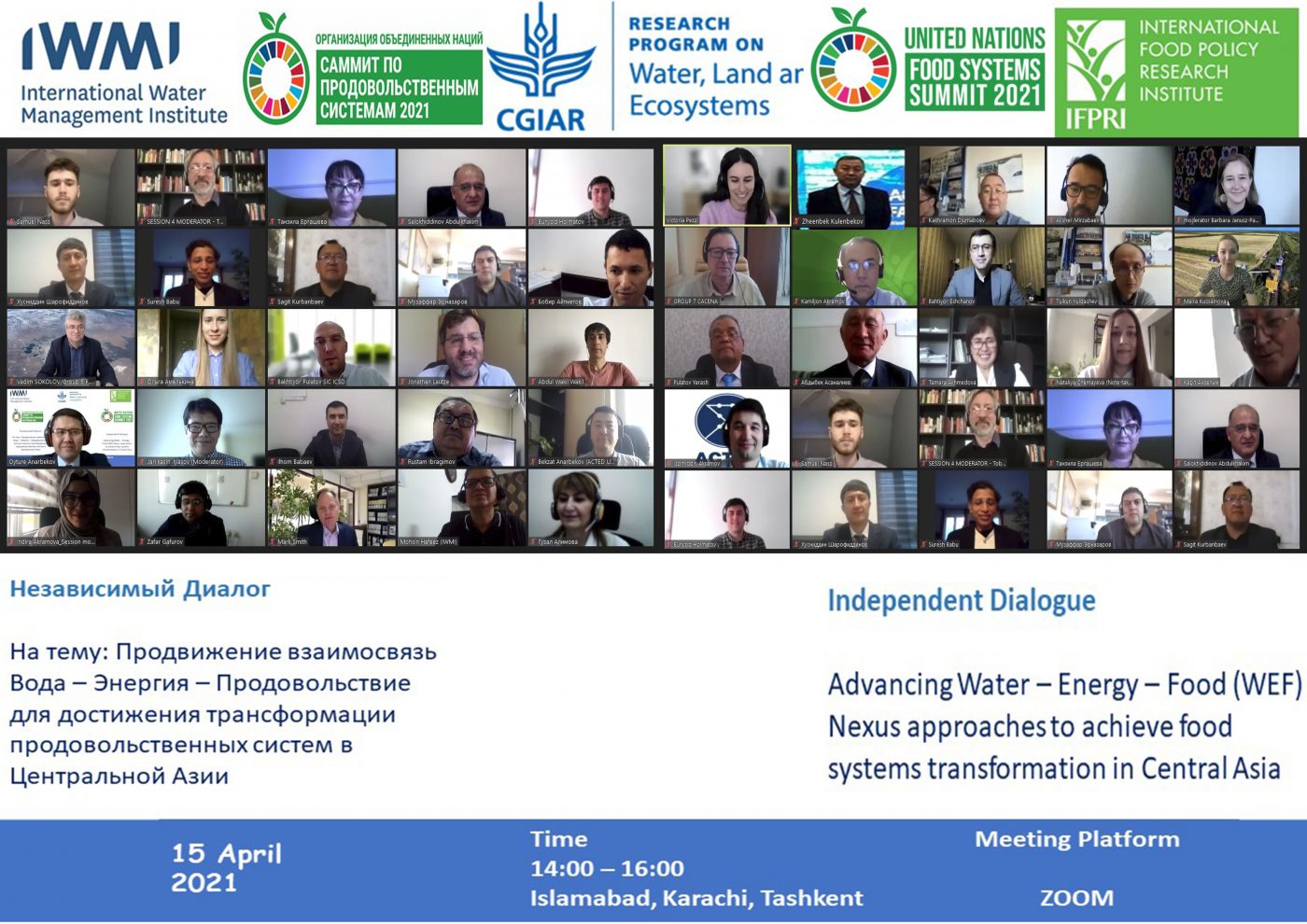The UN Food Systems Summit (UNFSS) Central Asia Independent Dialogue on the topic «Advancing Water-Energy-Food Nexus approaches to achieve food systems transformation in Central Asia» was held online on the 15th of April 2021.
The event was organized by the International Water Management Institute (IWMI) (Central Asia Office — Tashkent, Uzbekistan). In total, 92 participants from different countries attended the Dialogue. Most of them were from Central Asian countries — Kazakhstan, Kyrgyzstan, Tajikistan, Turkmenistan and Uzbekistan, but there were also participants from Europe, America and Russia.
The event turned out to be interdisciplinary with representatives from different sectors of economy, science, education, government, as well as from NGO. The work of seven discussion groups was organized with focus on different topics, such as the transition towards low-carbon energy for food production, climate change impacts on water and food security, enhancing resilience of water system across multi-sector (agriculture, domestic, industry and environment), socio-economic benefits of Water-Energy-Food (WFE) nexus.
Population growth, socio-economic development, climate change, development of hydropower, as well as changing consumer behaviour and habits contribute to an increase in demand for water, energy and food. Water scarcity is one of the most serious problems for the Central Asian countries. Irrigated agriculture consumes about 80% of all water withdrawn in this region. The Aral Sea almost disappeared. Finding a balance between sectoral needs for agriculture and hydropower is challenging as the region’s transboundary water flow is also disrupted. Climate change and population growth will put additional stress on the region’s water resources with 10 to 30% less water available in the local rivers by 2050.
The main topic of the Dialogue is to find a balance between sectoral needs. Oyture Anarbekov, IWMI Regional Manager for Central Asia and curator of the event:
«Transitioning from competition among sectors to cooperation – including across the WEF nexus – will be a vital part of the story of food system transformation in the region».
During the event, the need for a systems approach to decision-making was discussed, as well as the role of interdisciplinary dialogues, the possibility of introducing innovations and investments in technologies for preserving and saving water. The importance of diversifying the system for growing crops, as well as introducing drought-resistant crops was emphasized. Participants deliberated on the importance of building resilience in interconnected food systems, from local to global, while protecting critical water sources, biodiversity and other ecosystem services. Discussions aimed at reaching a common understanding and finding local solutions to the challenges facing food systems transformation and role of WEF nexus in this process under climate uncertainty in the region.
Anastasia Tsvetkova and Olga Amelkina, representatives of Lake Baikal Foundation, took part in this event. Anastasia Tsvetkova, CEO of Lake Baikal Foundation, noted:
«Even though now in Russia the issue of water scarcity is not on the agenda, the topic of an integrated approach to water resources management applying WEF nexus should be discussed on the highest level.
To solve urgent problems in the water sector, it is important to involve representatives from different sectors of the economy, science, education, NGO, as well as representatives of different age groups to a dialogue with the government. This can bring new perspectives to problems and contribute to its solutions.
It is important to provide personnel in the field of water resources management with not only special knowledge but also with interdisciplinary knowledge and skills of systems and critical thinking. We need to focus on training of highly qualified personnel now».
The UNFSS Central Asia Independent Dialogue is the initiative of the IWMI Central Asia Office. This Dialogue was organized to provide an opportunity for stakeholders to discuss WEF nexus approach and contribute to the UN Food Systems Summit in September this year (for more information about the Summit visit UNFSS).


